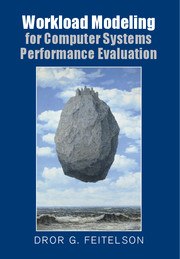Book contents
- Frontmatter
- Dedication
- Contents
- PREFACE
- 1 Introduction
- 2 Workload Data
- 3 Statistical Distributions
- 4 Fitting Distributions to Data
- 5 Heavy Tails
- 6 Correlations in Workloads
- 7 Self-Similarity and Long-Range Dependence
- 8 Hierarchical Generative Models
- 9 Case Studies
- 10 Summary and Outlook
- Appendix Data Sources
- Bibliography
- Index
9 - Case Studies
Published online by Cambridge University Press: 05 March 2015
- Frontmatter
- Dedication
- Contents
- PREFACE
- 1 Introduction
- 2 Workload Data
- 3 Statistical Distributions
- 4 Fitting Distributions to Data
- 5 Heavy Tails
- 6 Correlations in Workloads
- 7 Self-Similarity and Long-Range Dependence
- 8 Hierarchical Generative Models
- 9 Case Studies
- 10 Summary and Outlook
- Appendix Data Sources
- Bibliography
- Index
Summary
This chapter presents an assortment of published results pertaining to computer workloads. They range from a specific measurement or observation to a complete workload model for a particular domain. Regrettably, in many cases the available data is sketchy and based on a single study from a specific system, rather than being based on a meta-study that summarized many original studies conducted under diverse conditions.
Likewise, many of these studies are not the final word in the sense that they focus on a single element of the workload, and not on the complete picture. A comprehensive model would require the identification of the most important parameters, their characterization, and a characterization of the interactions between them (e.g., [761, 670]).
Thus there are many opportunities for additional studies on workload characterization and modeling.
HUMAN USER BEHAVIOR
A chief concern regarding computer workloads is their dependence on changing technologies. Will measurements performed today still be relevant next year? One area that is excused from such considerations is that of workloads that reflect basic human behaviors. The issue here is the patterns of how users generate new work when they interact with a computer system. At a very basic level such patterns reflect human behavior regardless of the system and are therefore largely invariant.
This does not imply, however, that all human users are the same. On the contrary, human users are very variable in terms of temperament and abilities, which is reflected in their computer-related behavior [726, 181]. Moreover, they may sometimes behave in unpredictable ways [211]. This just adds to the natural variability of the workload.
9.1.1 Sessions and Job Arrivals
The patterns of user sessions and the resulting job arrivals form the basis of user-based workload modeling, which was discussed at length in Section 8.3. To recap, its main attributes are as follows:
▪ Different users create sessions with different characteristics, but the largest group is made up of “normal” users working normal hours.
[…]
- Type
- Chapter
- Information
- Workload Modeling for Computer Systems Performance Evaluation , pp. 399 - 489Publisher: Cambridge University PressPrint publication year: 2015
- 1
- Cited by



